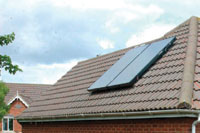With alternative energy power sources for the home becoming more and more accessible and potentially a real consideration against traditional power supplies, the new Clean Energy Cashback scheme could be the persuading factor for many homeowners and communities looking to react with the times and switch to microgeneration.

The scheme, also referred to as feed-in tariffs, means homeowners, businesses, organisations and community groups could all receive up to £1,000 from the government annually and reduce their bills by generating their own electricity with a small-scale green energy installation.
Under the scheme, which was launched on April 1, you can receive two payments – one for generating your own electricity and a second if you export electricity you don’t need back to the grid.
Solar PV panels, wind turbines, hydroelectricity, anaerobic digestion and micro-combined heat and power such as the Baxi Ecogen all qualify under the microgeneration banner, giving customers a wide variety of options best suited to their location and requirements. And with grants available for the cost of the systems, the Clean Energy Cashback scheme is further evidence of a firm government push towards alternative energy solutions to reduce the nation’s CO2 emissions.
To put it into perspective, an average-sized 2.5kW solar photovoltaic system costing £12,500 (before discounting a grant fee to help cover the installation cost) will entitle you to a generation tariff of 41.3p per kilowatt hour and an additional 3p for every kWh exported back to the grid. Experts are predicting a solar PV return of between 7 and 10 per cent.
Feed-in tariffs are fairly well established outside of the UK. Germany successfully introduced a similar scheme in 2000 which have generated good success despite payment levels being cut. The French government launched feed-in tariffs a year later and have recently upped the rates for solar PV, geothermal and biomass systems. And photovoltaic electricity generation has become the most popular technology in Spain since the country gave the go-ahead to a feed-in tariff legislation in 2007.


